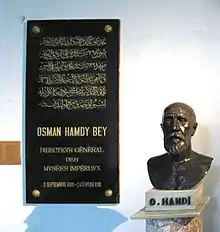Yervant Voskan
Yervant Voskan (1855, Istanbul – Istanbul 1914) was an Armenian painter, sculptor, instructor, and administrator. He is the first known sculptor in modern Turkish sculpture history and as the first sculpture teacher at the Sanay-i Nefise he educated the first generation of Turkish sculptors.[4][3][5]
Երվանդ Հակոբի Ոսկան Երվանդ Ոսկան | |
 Bust of Osman Hamdi Bey by Yervant Voskan | |
| Born | Yervant Voskan 1855 |
| Died | 1914 |
| Nationality | Ottoman |
| Known for | sculpture, painting |
Early life and studies
Yervant Voskan was born in 1855 in Samatya, Istanbul into an Armenian family[6] as the son of writer Hagop Voskan (1825 – 1907). His grandfather was Voskan Gotogyan of Erzurum, a foundryman at the Imperial Mint.[5] After receiving his primary education from his father, he attended the Catholic Makruhyan Armenian School in Beşiktaş and the Pera Hayr Ananya school. In 1866, with the support of his family, he went to Venice to study at the Murad Raphaelian School. There he was a student of Luigi Qura. Later he continued his studies in Rome at the Rome Imperial Art School as a student of Enrico Bektti and Cirolana Mazzini. In 1878 he was sent to Paris on a state scholarship to be educated in sculpture.[4]
Career
Upon his return to the Ottoman Empire in 1881 he aided in the founding of the department of sculpture at the Sanâyi-i Nefîse Mekteb-i Âlisi in 1883. It was one if the schools first departments and Voskan was its first teacher.[2][4] He began teaching sculpture in the academy on March 1, 1883.[6] At the time, he was the only professor of sculpture in the Ottoman Empire. The first time period was spent looking for students to teach as it was difficult at the time to find students who wanted to study sculpture. Eventually İhsan Özsoy, İsa Behzat, Mehmet Bahri and Mesrur Izzet would become Osgan Efendis first students and would be the first representatives of Turkish sculptors in sculpture history. In his 32 years at the school, Oskan would teach the first generation of Turkish sculptors.[3][5][1] Voskan is credited with educating the first generation of sculptors of the Republic of Turkey.[2]
Archeological work
Along with Osman Hamdi Bey, Voskan conducted the first scientific based archaeological in the history of the Ottoman Empire. His archaeological research included the Commagene tomb-sanctuary in Nemrut Dağı in south-eastern Anatolia and the Alexander Sarcophagus in Sidon.[7] He was the chief restorer of the Sarcophagus.[5] Yervant Voskan eventually retired from the academy in 1908 and died only 6 years later.[8]
References
- Kuzucular, Şahamettin. "Yervant Osgan İlk Türk Heykelcisi ve Hocası". www.edebiyatvesanatakademisi.com. Retrieved 2022-09-18.
- Mimar Sinan Fine Arts University. "HEYKEL BÖLÜMÜ".
- Renda, Günsel; Kortepeter, C. Max (1986). The Transformation of Turkish culture : The Atatürk Legacy. Princeton, N.J.: Kingston Press. p. 136. ISBN 9780940670105. Retrieved 28 November 2012.
- "AN OVERVIEW OF TURKISH SCULPTURE". TurkishCulture.org. Turkish Cultural Foundation.
- Kurkman, Garo (2004). Armenian painters in the Ottoman Empire 1600-1923. İstanbul: Matüsalem Publications. ISBN 9789759201555. Retrieved 28 November 2012.
- F. Ozturk, Nancy (2005). Eyüp Sultan symposia I - VIII : Selected Articles. Istanbul: Municipality of Eyüp, Directorate of Culture and Tourism. p. 112. ISBN 9789759384494. Retrieved 28 November 2012.
- Özdoğan, Günay Göksu (2009). Türkiye'de Ermeniler : cemaat, birey, yurttaş (in Turkish) (1. ed.). Şişli, İstanbul: İstanbul Bilgi Üniversitesi Yayınları. p. 99. ISBN 9786053990956. Retrieved 28 November 2012.
- Kasaba, Reşat, ed. (2008). Turkey in the modern world (1. publ. ed.). Cambridge, UK: Cambridge University Press. p. 427. ISBN 9780521620963. Retrieved 28 November 2012.